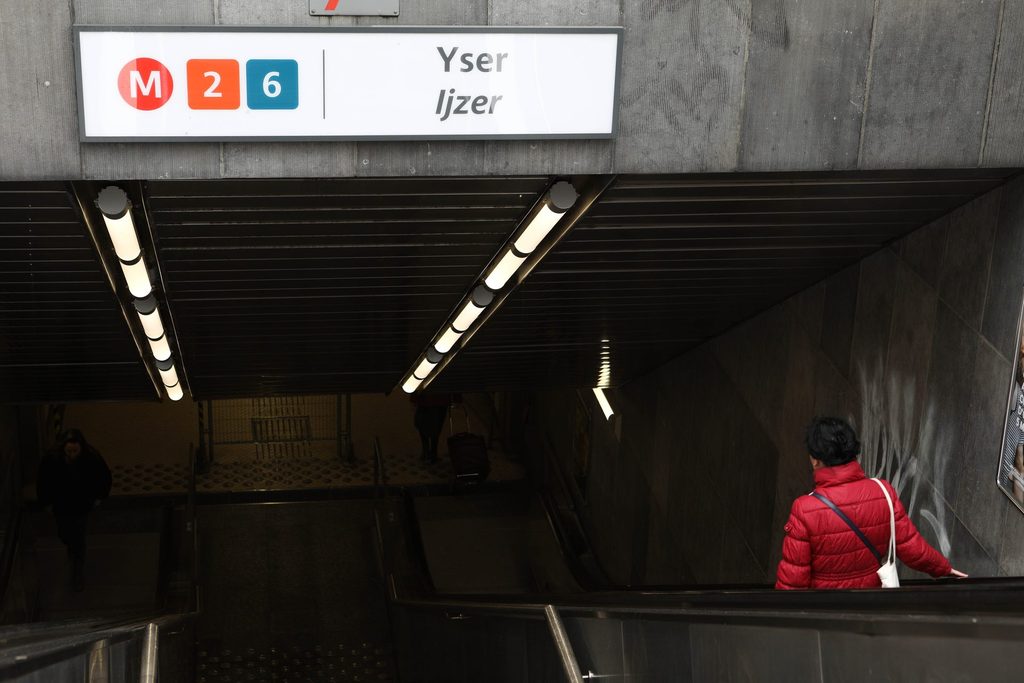The area around the Brussels Yser metro station has seen a series of drug-related incidents in recent weeks and months that have shocked local residents and led to calls for city authorities to confront the issue.
But the problems have many aspects, some of which date back decades. Long foisted with the nickname "Chicago" on account of the high rates of petty crime, the area has struggled to clean up its image despite inroads being made to tackle theft and vandalism. Its latest affliction is hard drug use, again reminiscent of the American city in the 1980s.
"More than three in four Brussels drug users we see are now on crack," Julien Fanelli, director of projects at Transit, a local organisation that counsels people with drug addiction, told De Standaard.
The capital has observed a shift in popularity from heroin to crack and the Yser metro station has become an epicentre, bringing with it petty crime and a sense of insecurity.
Where dealers go, users follow
"The shift is definitely not good, crack is even worse than heroin," said Fanelli. "Heroin users have to use it every five to six hours to avoid getting sick. For crack users, it is only three to four hours; they are constantly thinking about their next hit."
Heroin addicts can also take methadone, which allows them to go for up to 24 hours before needing another dose. For crack, such an alternative does not exist.
Crack is a smokable variant of cocaine and is derived from combining the drug in its powdered form with water and another substance, usually baking soda. Due to the port of Antwerp's drug problem, the drug is very easy to obtain in Belgium: small doses can be bought for as little as €10.
"For years, the neighbourhood around Yser and the neighbouring Ribaucourt metro station has attracted drug trafficking," Fanelli said. "There are many arterial roads, the area is on the border between two municipalities and two police zones. And where dealers go, users follow."
With the area's drug problem going from bad to worse, the Ribaucourt neighbourhood committee sent a letter to Molenbeek Mayor Catherine Moureaux to denounce the situation and call for a plan of action. On Tuesday, the neighbourhood committee yet again went to Brussels City Mayor Philippe Close to demand a more constant police presence.
Neighbourhood youth organisations have sounded the alarm on several occasions, saying that the feeling of insecurity in and around the metro stations is so great that parents would rather take their children somewhere by car than let them take the metro alone. They are adamant that meaningful progress can only be made with greater police presence and increased security.
"There is a reason crack is so popular," Fanelli said, explaining that the Covid-19 pandemic and subsequent inflation have only made life harder for people at the bottom of the ladder in Brussels. "These people need help."
The Capital Region currently faces a serious housing crisis and frontline shelters like Samusocial's are all but saturated. "The step to the street and the intoxication that can be found there then becomes smaller. Additionally, the places where addicts can get care are few and far between."
Mayor Close has said that he understands the concerns of local residents but added that he cannot perform short-term miracles. The police are trying to fight the dealers but the only thing they can do with users is put them in the cell for a few hours. "Police officers are not doctors," Close stated.
The mayor pointed to the GATE user space (located on the other side of the city, near the Brussels-South/Midi train station), which opened last year and has so far been a great success. A similar centre – with a health component, crisis shelter, therapeutic counselling and a user space – will also be opened near Yser, but not until 2026 at the earliest.
For several months, Brussels transport company STIB, Samusocial and several local non-profit organisations have been working together in an integrated approach to assist people staying in metro stations, including drug users.
Recently, Brussels Welfare Minister Alain Maron announced that he wants to open a third user space and is looking at the Yser area or the North Station, but no start date has been set.

